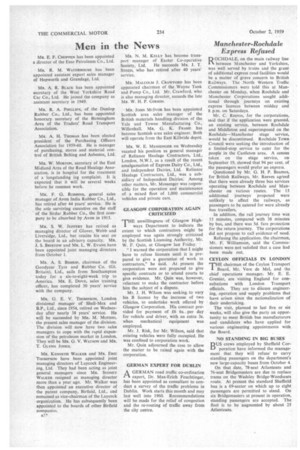Manchester-Rochdale Express Refused
Page 56

If you've noticed an error in this article please click here to report it so we can fix it.
ROCHDALE, on the main railway line between Manchester and Yorkshire, was well served by trains and the grant of additional express road facilities would be a matter of grave concern to British Railways. The North Western Traffic Commissioners were told this at Manchester on Monday, when Rochdale and Manchester Corporations sought additional through journeys on existing express licences between midday and 8 p.m. on Saturdays.
Mr. C. Reeves, for the corporations, said that if the application were granted, an existing service, between Rochdale and Middleton and superimposed on the Rochdale—Manchester stage service, would be discontinued. Rochdale Town Council were seeking the introduction of a limited-stop service to cater for the people in the Castleton area. A census taken on the stage service, on September 19, showed that 94 per cent. of the passengers would prefer an express.
Questioned by Mr. G. H. P. Beames, for British Railways, Mr. Reeves agreed that there were already three bus services operating between Rochdale and Manchester on various routes. The 15 additional journeys proposed were unlikely to affect the railways, as passengers to be catered for were already bus travellers.
In addition, the rail journey time was 15 minutes, compared with 38 minutes by bus, and there was 5d. fare protection for the return journey. The corporations did not propose to call evidence of need.
Refusing the application, the chairman, Mr. F. Williamson, said the Commissioners were not satisfied that a case had been made out.
CEYLON OFFICIALS IN LONDON
THE chairman of the Ceylon Transport Board, Mr. Vere de Mel, and the chief operations manager, Mr. E. E. Grenier, are visiting England for consultations with London Transport officials. They are to dilcuss engineering, operation and supply problems that have arisen since the nationalization of their undertaking.
The visit, planned to last five or six weeks, will also give the party an opportunity to meet British bus manufacturers and candidates who have applied for various engineering appointments with the Board.
NO STANDING IN BIG BUSES
BUS crews employed by Sheffield Corporation have informed the management that they will refuse' to carry standing passengers on the department's new large-capacity buses from October 4.
On that date, 78-seat Atlanteans and 76-seat Bridgemasters are due tb replace trams on the WadsIey Bridge-Woodseats route. At present the standard Sheffield bus is a 69-seater on which up to eight passengers are permitted to stand. On six Bridgemasters at present in operation, standing passengers are accepted. The fleet is to be augmented by about 25 Atlanteans.












































































































































































































































